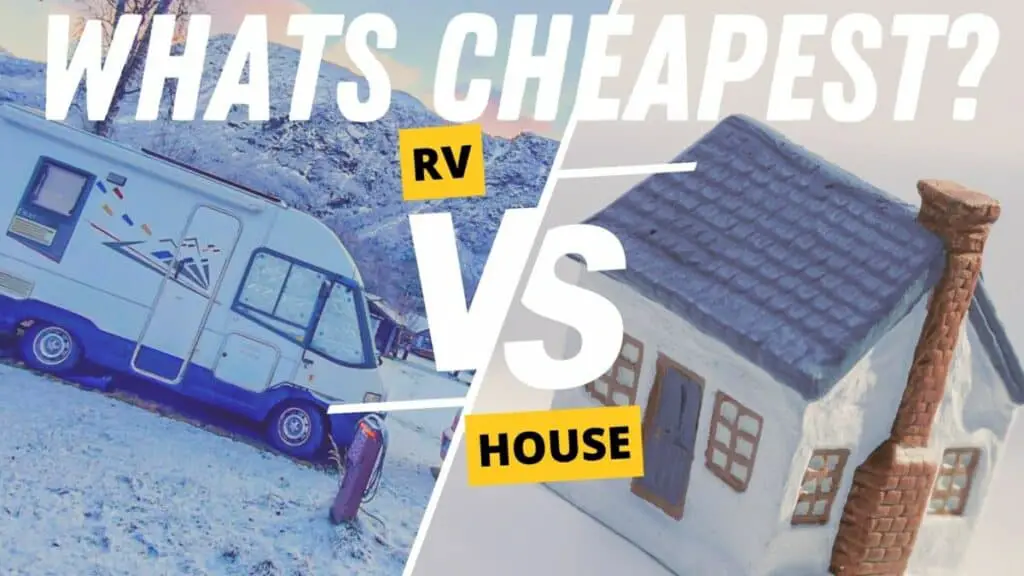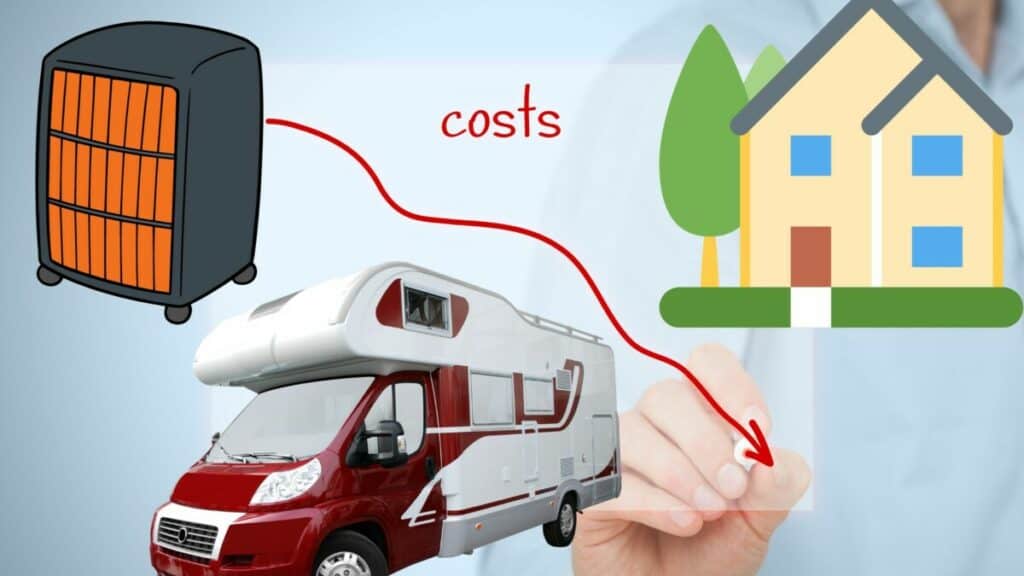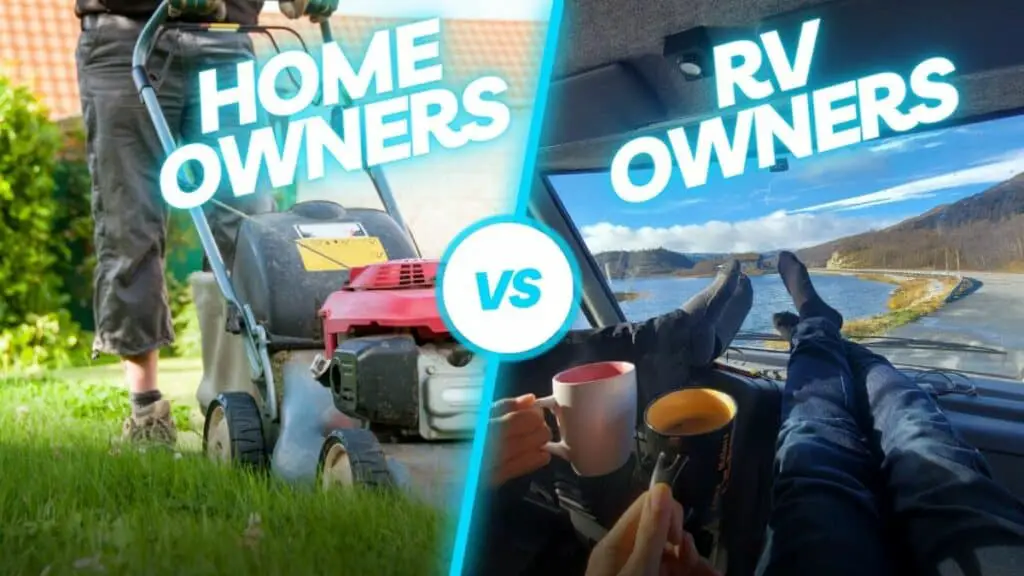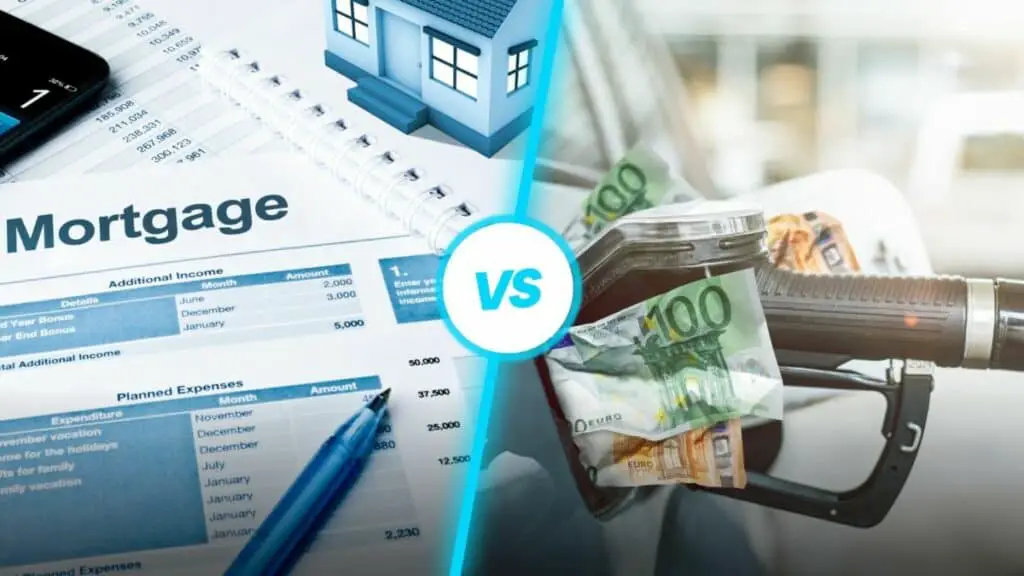This post contains affiliate links (I get a commission at no extra cost to you for purchases made through links in this post).

Interest rates are going up, and there isn’t relief in sight. Many are turning to smaller living, opting for RVs or trailers instead of homes. You may be wondering — is actually the cheaper route, or is it just easier?
For most people, it is cheaper to live in an RV, my wife and I can spend as little as $1,000-$1,500 dollars per month if we boondock or stay at a cheap campsite. However, if you do a cross-country tour and stay at expensive campgrounds, it quickly gets more expensive than living in a house.
If you’re trying to choose between a traditional home and an RV, there are many things to consider. The rest of this article will go over a few of these essential considerations and give you examples of the pros and cons of RV living.
Will Living in an RV Save You Money?
You’ve heard it before. It’s the dream of many to travel the world and see new places. While this may be an excellent idea, how can you afford to do it? Living in an RV is one way to do it on a budget, but this answer gets a bit tricky because some other things need to be considered:
- The start-up costs.
- Cost of living in your state.
- Your desire to travel (cross-country or minimally).
- How do you plan on feeding yourself and getting laundry done?
- Taxes and registration in your area.
There are a few other things, too, but in general, my thoughts are this: living in an RV can save you money!
The living costs for both my wife and me when we live a bit more stationary in our RV is about $1,000-$1,500 USD per month, and if we move around more or have some larger expense that month, it could be another $500-$1,000 USD.
Living in an RV Saves Money on Housing Costs

RVs are a great way to save money on housing costs. The average American spends about 25% of their income on housing. Still, you can cut that down significantly if you live in an RV and pay for camping at state parks or other public areas.
An average two-bedroom apartment in the US costs around $1,295 per month; meanwhile, the average monthly fee for an RV park varies but is typically under this with many options in the $500-$1,000 dollar range.
I found a great deal at a small campsite last winter in Norway for as little as $160 dollars per month including electricity! So it is possible to cut costs significantly!
Living in an RV Saves Money on Utilities
RVs are also great ways to save money on utilities. Since they’re basically mobile homes that run on electricity, water, and propane (or sometimes solar power), you don’t have to worry about paying for gas or heating bills like a traditional house with its own septic and furnace system.
And since most people don’t spend much time inside their RVs during the day anyways (unless it’s raining outside), many people skip installing televisions altogether, which means no more cable bills!
If you are staying at campsites you will usually have to pay extra for electricity but sometimes it can also be included in the price but more on how much you can expect to pay for electricity at campgrounds you can find here in my other article.
There’s No Necessary Yard Work When Living in an RV

Since there’s no yard work to be done (because there’s no yard), no lawnmowers or other landscaping equipment is needed either. This means you won’t have to cut the grass every week or plant flowers yearly as some people do with their homes.
Additionally, if you’re someone who typically pays a lawn service to care for your lawn, you’ll save a lot of money by living in an RV.
Important Things To Consider Before Living in an RV
Living in an RV is not all fun and games. You can’t just park your RV anywhere you want — you’ll need a place to park it. You’ll still need to keep up with registration, taxes, and insurance, and you’ll have to ensure it stays in good condition (the average cost of repairs is $2500).
There are also other costs we tend to forget about:
- You’ll have a monthly subscription for the lot, whether it’s a public or private lot that you’re staying in.
- Insurance is something you’ll need to pay annually.
- Maintenance on your vehicle and any other amenities (like a washer/dryer) that you may want is something that you should budget yearly.
However, if these costs are no problem for you, there are still some important things to consider before moving into an RV, which I’ll discuss in the following sections.
The Cost of Living in Your Region

The cost of living varies everywhere, so this is an essential consideration. You may already know that the rent in California, or the cost of a house in Colorado, is wildly different than the cost of living in a place like Missouri or Wyoming. Because prices vary so much from state to state, the threshold at which you’re saving money will be different.
For example, the average home in Colorado is somewhere near $577,500. The average home in Wyoming, just above Colorado, is $290,000.
However, the average RV costs between $10,000 and $300,000 in total. In both scenarios, you usually save money if you stay toward the lower end. But when it comes to the higher cost of living state, you’re saving by a ton!
In the same way, buying a luxury RV to travel across the country and using all of the latest gadgets and gizmos might put your threshold a little closer to the not saving money category if you live in a state with an already low cost of living, like Iowa or Arkansas.
The Down Payment Process & Start-Up Costs
The process of purchasing an RV is similar to buying a home. It may not require as much down payment, but the process takes time and includes finding and comparing different models before you make your final decision.
Instead of a down payment and mortgage payments, you’ll be paying off an RV loan. This may be positive if your income puts you over the limit for qualifying for an FHA loan or if you don’t have much money to put down on a home.
A house does need maintenance, and things do break, but it’s not a given like it is with an RV. You’ll need an oil change from time to time along with new tiers or maybe you need a new fridge or water heater; other things can go wrong under the hood as well, depending on how much you drive.
You’ll also have depreciation to contend with — which is higher for RVs than homes — so you may not be able to resell your RV for even close to what you bought it for once you rack up miles on it. Compared to a house that instead might go up in value and earn you money in a few years.
Most likely your RV will depreciate in value while a house have higher chances of actually gaining value although you will never know if or how much beforehand but it could be a big difference that should be considered.
The start-up costs associated with living in an RV will vary depending on the type of vehicle you choose, including whether it’s used or new and how much it costs upfront. A well-maintained RV is necessary when living in such a small space, but if a leak occurs or something breaks down, the costs can quickly add up and make staying on the road seem impractical.
Price of Gas Versus Mortgage

While most home costs are essentially non-existent in the RV world, for some things, you actually end up trading one cost for another.
Campgrounds you stay at can include amenities like laundry and internet services, which are expenses in a traditional home.
However, this isn’t always the case. You should ask about these before booking a site and not just throw them into the “free” category as you calculate. RV parks can quickly become more expensive than living in a house.
If you want to travel, you’ll need fuel. Fuel can be expensive, especially if you’re going on long trips. To save money on gas when traveling in an RV, there are a few things that you can do:
- Use a fuel-efficient vehicle.
- Find gas stations with reasonable prices.
- Stay on top of preventative maintenance.
Keeping up on a preventative maintenance schedule with oil changes, tires, wiper replacements, and the like will help your fuel economy. It also requires a trusted mechanic and quite a bit of money at their shop.
Most homeowners must pay property taxes and insurance premiums each year. If you’re a renter, however, those costs will not apply. You’ll still have monthly rent payments and all the expenses that come with that — but at least they’re predictable!
Another thing to keep in mind is that while property taxes aren’t an issue when it comes to owning your own vehicle (if it’s not connected to land), there are other costs associated with having an RV; auto insurance premiums, maintenance expenses, and fuel costs are just some examples.
Renting Space for Your RV

If you’re living in an RV full-time, then there are a lot of other costs that you’ll have to consider when living in an RV. These can include propane, water bills, and sewer charges if your rig has plumbing. How much it actually costs to fill up an RV water tank? You can check out my other article here.
Or, if you want to know my experience of how much it costs to heat an RV with propane during the winter, check this out.
Depending on where you park your vehicle, some of these costs may be included as part of the monthly rent, or they might not be included at all!
Food, Storage, and More
While living in an RV may seem like the perfect way to save money on your housing costs, it’s important to note that you’ll still need to pay for food and utilities. That said, if you’re willing to sacrifice various luxuries and purchase an RV that suits your needs rather than what’s currently popular on the market, then it might be possible for you to save some money by living in one full-time.
If you’re looking forward to eating out frequently while traveling across the country, then living in an RV will not be as cost-effective as buying a home with all its modern conveniences.
There are plenty of ways for people who live in RVs to cook their own meals without breaking the bank (you can even find free recipes online).
The Bottom Line
If you’re looking to save money, RV living is definitely a great option, as long as you continue making good choices.
There are many benefits to RV living. You’ll be able to live in a tiny space and see the world or enjoy your life without worrying about a hefty monthly payment, a large down payment, or interest rates.
However, remember that access to luxuries like laundry and internet services can add up when living the RV lifestyle. You’ll also need to consider your monthly space reservation fee if that’s the route you go or the cost of gas if you plan on constantly traveling.
Conclusion
Whether or not it’s cheaper to live in an RV or a house greatly depends on factors you get to decide on. For those who want to park their RVs in the same spot or travel minimally, a standard RV will be much cheaper in the long run than a house.
However, this also depends on your state’s cost — an RV in California will be a dozen times cheaper than a home. In contrast, an RV in Kansas might be similar in price to a house there.
